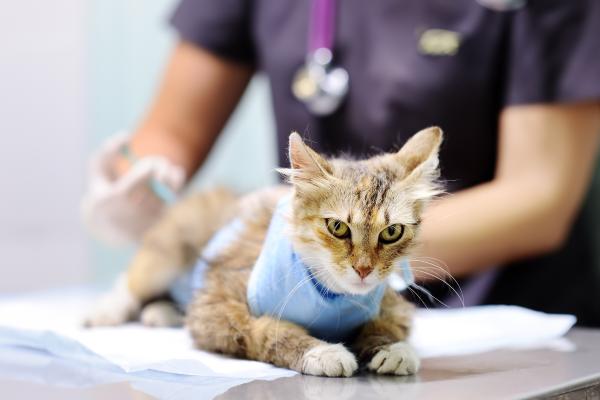Can You Give Cats Human Antibiotics?



See files for Cats
We should never give human antibiotics to a cat. There are many reasons why this is prohibited behavior for cat guardians. The same applies to all drugs. Often, the specific drug will be toxic to cats. Not only will it not treat the bacterial infection for which antibiotics are used, but it can cause intoxication and even be fatal to the cat. Even in cases where the drug is not directly toxic to cat, giving them antibiotics which have not been directly prescribed can have many other negative effects on the cat's wellbeing.
At AnimalWised, we ask can you give cats human antibiotics? We explain in greater detail why this behavior is prohibited, as well what to do if you have already given your cat antibiotics.
Can I give human antibiotics to my cat?
it is not recommended to give human antibiotics to cats without the guidance and prescription of a veterinarian. Cats have different physiological and metabolic characteristics compared to humans. Their bodies may react differently to medications, including antibiotics.
Antibiotics for humans are specifically formulated and dosed based on human physiology. Some antibiotics that are safe for humans may be drugs that are toxic or ineffective for cats. Additionally, the dosage and duration of treatment may vary significantly between species.
Furthermore, using antibiotics without proper diagnosis and veterinary supervision can lead to inappropriate or ineffective treatment, mask underlying conditions, contribute to antibiotic resistance and potentially harm the cat's health. Instead of treating a bacterial infection, it can reduce the cat's ability to fight pathogens and further complicate the clinical picture. This can lead to the death of the cat.
If you suspect that your cat requires antibiotics, it is important to consult with a veterinarian. They will evaluate the cat's condition, perform any necessary diagnostic tests and prescribe the appropriate antibiotic based on the specific bacterial infection. They will also consider the cat's individual needs. Following veterinary guidance is essential to ensure the safety and wellbeing of your cat.
What sort of antibiotics do cats need?
Cats may require antibiotics for various bacterial infections, and the specific antibiotic prescribed will depend on the type of infection and the susceptibility of the bacteria involved. Here are some commonly used antibiotics for cats:
- Amoxicillin/clavulanic acid: this combination antibiotic is effective against a wide range of bacterial infections in cats, including skin infections, respiratory infections, urinary tract infections, and bite wound infections. Learn more with our article on giving amoxicillin to cats.
- Cephalexin: is commonly used to treat skin infections, urinary tract infections and respiratory infections in cats. Learn more with our article on cephalexin for cats.
- Clindamycin: this antibiotic is effective against certain types of bacterial infections, including dental infections, skin infections, and bone infections in cats.
- Enrofloxacin: a broad-spectrum antibiotic that is often used for more serious infections, such as deep-seated urinary tract infections, respiratory infections, or infections involving multiple body systems.
- Azithromycin: this antibiotic is frequently used to treat respiratory tract infections, such as feline upper respiratory infections (URI) caused by certain bacteria or mycoplasma.
- Metronidazole: commonly used to treat certain gastrointestinal infections, such as giardiasis or inflammatory bowel disease (IBD) in cats. Drugs like metronidazole are often given to cats with diarrhea.
As stated above, the choice of antibiotic and dosage should be determined by a veterinarian based on the specific bacterial infection and the individual cat's health status. It is important to follow the veterinarian's instructions, complete the full course of antibiotics as prescribed, and schedule any necessary follow-up visits to ensure proper treatment and recovery.

Can I give my cat amoxicillin?
Administering amoxicillin or any medication from your drug cabinet to your cat without veterinary guidance can be risky and potentially harmful to your pet. Here are a few reasons why:
- Incorrect dosage: human medications are formulated and dosed based on human physiology, which may differ significantly from that of cats. Giving an incorrect dosage can lead to ineffective treatment or an overdose.
- Adverse reactions: cats may have different sensitivities and reactions to medications compared to humans. Some drugs that are safe for humans may be toxic to cats. Without proper veterinary assessment, you may inadvertently expose your cat to a medication that can cause severe side effects or allergic reactions.
- Underlying conditions: your cat may have pre-existing health conditions or be taking other medications that could interact negatively with amoxicillin. Only a veterinarian can assess your cat's overall health and consider potential interactions before prescribing medication.
- Incomplete treatment: bacterial infections in cats require appropriate diagnosis and treatment. A partial or incorrect treatment course due to self-administered medication can lead to antibiotic resistance or persistent infection.
What happens if my cat has a reaction to antibiotics?
When antibiotics are given to cats, they can potentially have various side effects. It's important to note that the specific side effects can vary depending on the type of antibiotic, the dosage, the individual cat, and their overall health condition. However, here are some common side effects associated with antibiotic use in cats:
- Gastrointestinal upset: antibiotics can disrupt the natural balance of bacteria in the cat's digestive system, leading to symptoms such as diarrhea, vomiting, or appetite changes.
- Allergic reactions: cats may develop an allergic reaction to antibiotics, which can manifest as itching, hives, swelling, or difficulty breathing. Severe allergic reactions can be life-threatening and require immediate veterinary attention.
- Superinfections: antibiotics can sometimes disrupt the normal balance of microorganisms in the body, allowing opportunistic infections to occur. These secondary infections can manifest in various ways, such as yeast infections or antibiotic-resistant bacterial infections.
- Kidney or liver damage: certain antibiotics, especially when used inappropriately or at high doses, can potentially affect the kidneys or liver in some cats. Monitoring kidney and liver function is essential during antibiotic treatment.
- Neurological symptoms: in rare cases, certain antibiotics may cause neurological side effects in cats, including seizures, tremors, or disorientation. These adverse reactions should be reported to a veterinarian immediately.
It's important to note that not all cats will experience these side effects. Many cats tolerate antibiotics well. However, if you notice any unusual symptoms or behavioral changes in your cat during antibiotic treatment, it's crucial to contact your veterinarian for guidance and assessment.

What to do if I have given human antibiotics to a cat?
If you have given antibiotics to your cat and they are experiencing a bad reaction, it is crucial to take immediate action. Here are the steps you should consider:
- Cease administration: stop giving the antibiotic medication to your cat immediately.
- Assess the situation: observe your cat's symptoms and behavior. Note any specific signs of an adverse reaction, such as difficulty breathing, severe swelling, vomiting, diarrhea or neurological symptoms like seizures or disorientation. This information will be helpful when you contact a veterinarian.
- Contact a veterinarian: reach out to your veterinarian or an emergency veterinary clinic right away. Describe the situation and provide details about the medication your cat has received, including the name, dosage, and duration of treatment. Explain the specific symptoms your cat is experiencing. Follow the veterinarian's advice and instructions carefully.
- Follow veterinary guidance: the veterinarian will provide you with appropriate guidance based on your cat's condition. They may ask you to bring your cat in for immediate evaluation or provide instructions for at-home care depending on the severity of the reaction.
- Provide supportive care: follow any instructions provided by the veterinarian regarding supportive care for your cat. This may include measures such as keeping your cat comfortable, offering water to prevent dehydration or administering any prescribed medications to manage the reaction.
Remember, time is of the essence when dealing with a severe allergic reaction or adverse medication response in your cat. Always prioritize seeking professional veterinary assistance to ensure the safety and well-being of your feline companion.

This article is purely informative. AnimalWised does not have the authority to prescribe any veterinary treatment or create a diagnosis. We invite you to take your pet to the veterinarian if they are suffering from any condition or pain.
If you want to read similar articles to Can You Give Cats Human Antibiotics?, we recommend you visit our Other health problems category.







